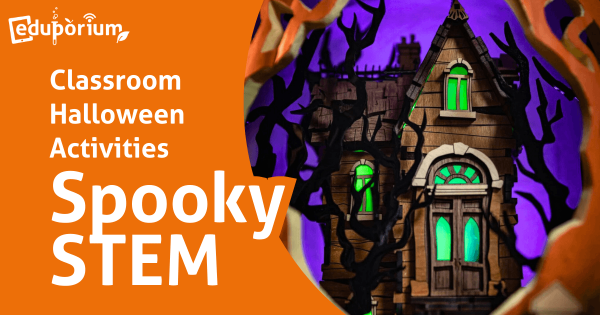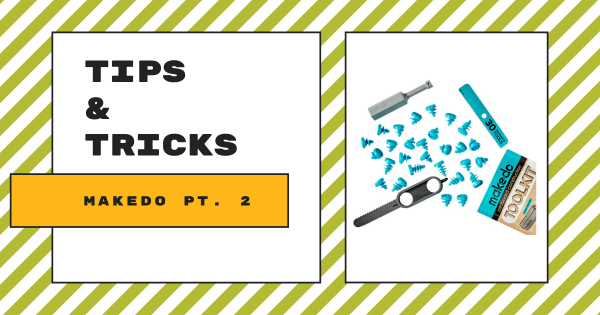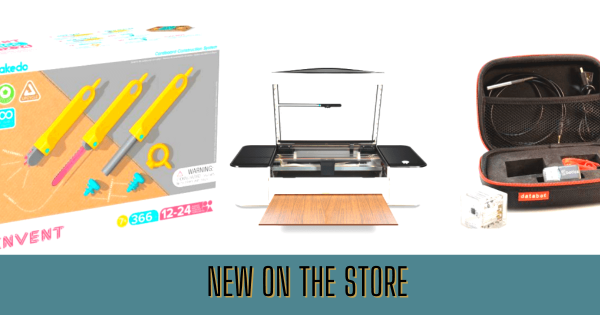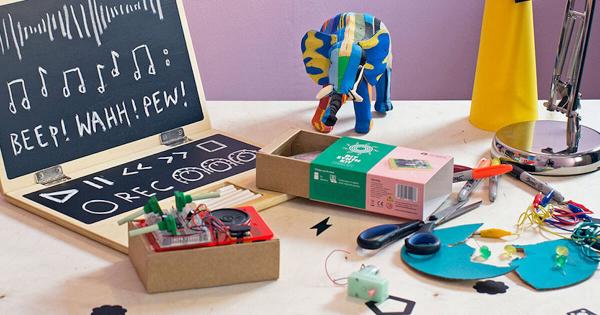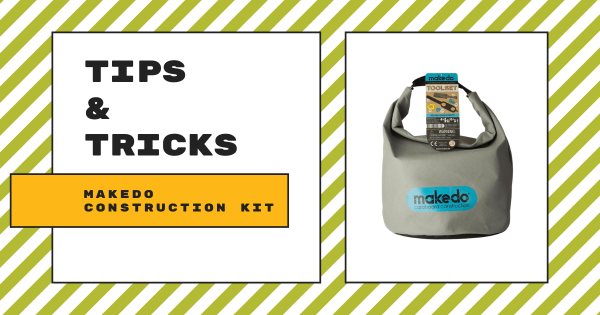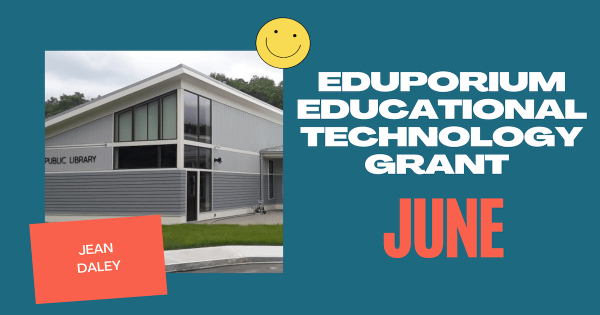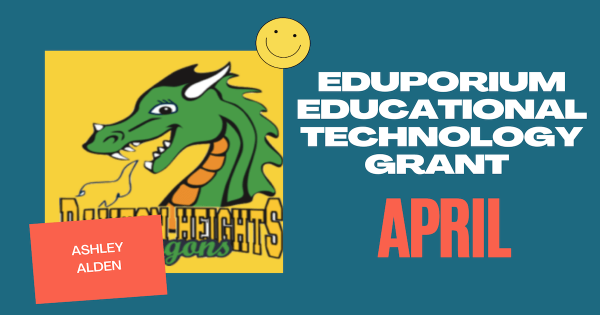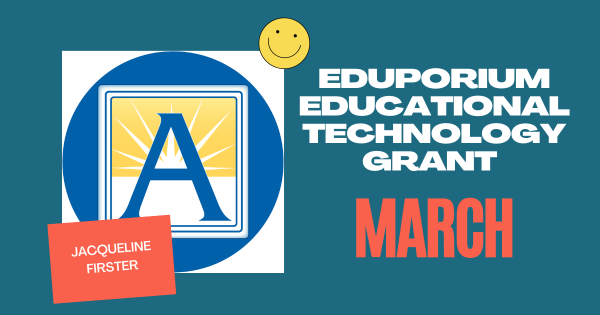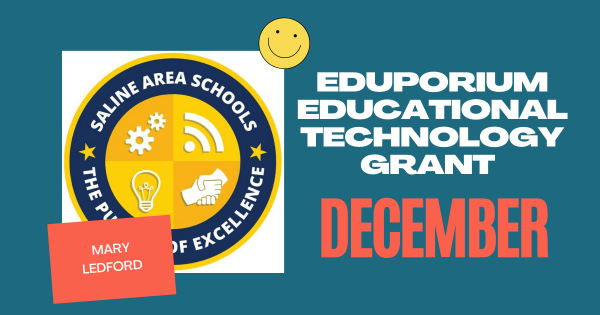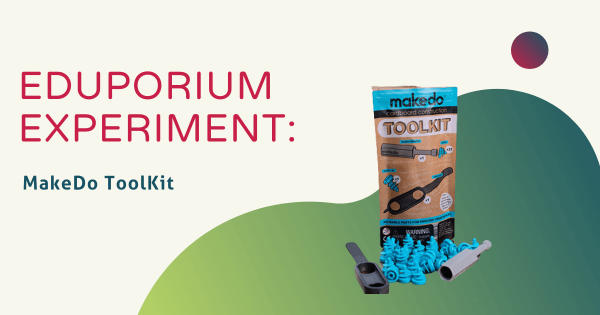Connecting STEAM to this real-world Halloween fun helps students to stay engaged and build some key skills. In these projects, they’ll explore design thinking, engineering, coding, and more by programming an Ozobot Evo to trick-or-treat, make a haunted diorama with the Glowforge 3D laser printer, customize a costume with the MakeDo tools, or doodle a life-sized 3D bat.
MakeDo
The MakeDo engineering kits stand out as valuable STEAM tools, offering a hands-on and creative approach to learning. They provide all students with the means for transforming everyday materials into functional creations, encouraging exploration, problem solving, and innovation. At the core of its deep educational value is an emphasis on fostering engineering and design thinking skills. The connectors, hinges, and plastic tools that comprise the versatile MakeDo system empower children to turn cardboard, plastic, and other materials into prototypes as they engage with the iterative design process. This approach helps them develop technical skills and also nurtures an experimental mindset and resilience in the face of challenges. And, since they're super simplistic, educators can use them with students as young as first grade—during or after school.
The versatility of these MakeDo kits supports a broad spectrum of STEAM activities. From constructing simple machines to elaborate structures, children gain more freedom to bring their ideas to life, promoting creativity and collaboration in the classroom. The tactile nature of these components appeals to children with various learning styles, making STEM concepts more accessible and engaging. The kits align seamlessly with this interdisciplinary nature of STEAM education, encouraging mixing art and design into standard STEM subjects. Its holistic approach reflects an authentic application of knowledge, preparing children for the collaborative and multifaceted challenges of the future. Also, they help add immense value to STEAM education by providing a dynamic platform for hands-on learning, fostering creativity, and instilling a passion for problem solving and innovation in students from a young age.
-
Tips & Tricks | The MakeDo STEM And Construction Kits
The simplistic MakeDo construction system is loved by many and it serves as a super valuable STEAM tool in and out of the classroom. It’s essentially a collection of replica construction tools, like screws, screwdrivers, and the saw, that kids can use for building with cardboard. They’re totally reusable, too, which helps kids learn the importance of repurposing and upcycling. -
Eduporium Weekly | What's New On Our Store?
Whether you’re looking for some new options for summer STEAM activities or actively on the hunt for some new classroom tools for once you’re able to get back, we pride ourselves on offering the largest variety of EdTech, STEM, and MakerEd tools all in one place. We’ve added new options from Sphero, MakeDo, Glowforge, and databot (among others). -
Tech Will Save Us and MakeDo: Two Summer STEAM Dreams
Perfect for some laid-back summer STEAM with plenty of opportunities for students to keep their key skills sharp, there are a variety of new kits from each company on our store. Grabbing any of these options helps make home projects or summer camp lessons more engaging, relevant, and fun for students in the elementary grades. -
Tips & Tricks | Using The MakeDo Construction Kits
The MakeDo system is part of a simple cardboard construction kit line that features a bunch of reusable plastic tools. Although it is very simplistic and super low-tech, the ideas and creation possibilities when weaving MakeDo inventions into education are endless. Teachers could even inspire creative play, critical thinking, and problem solving while kids learn by doing. -
We've Awarded Our EdTech Grant for June!
The recipient of our $500 EdTech grant for the month of June is Jean Daley, a librarian from the Erving Public Library in Erving, MA! Jean is committed to helping the kids in her community learn more about and with technology and will now be able to introduce them to coding and learning in new ways! -
Meet the Eduporium Grant Recipient for April: Ashley Alden!
As we do every month, we’ve selected a recipient for our $500 EdTech grant award for the month of April. The awardee is Ashley Alden, a teacher at Dayton Heights Elementary in Los Angeles, California. We really loved Ashley’s application and how she got the inspiration for the project she wants to work on with her students. -
Grant Award Announcement: Our Recipient for March!
It’s time to announce the recipient of Eduporium’s $500 EdTech grant for the month of March. And, the winner is…Jacqueline Firster, a dedicated makerspace manager and STEM teacher from Arlington Public Schools in Virginia. Jacqueline is going to be using her award to create a mobile makerspace and enriched PBL in her school. -
The Recipient of our December EdTech Grant: Mary Ledford
It’s that time of the month again—time to reveal the recipient of our $500 EdTech grant! To close out the first calendar year of our grant program, which has been tremendously successful in our eyes, we’ve decided to give December’s award to Mary Ledford, a librarian from Harvest Elementary School in Saline, Michigan. -
Eduporium Experiment | MakeDo ToolKit
Kids today don’t seem to have the same enthusiasm to build a pillow fort or make costumes out of cardboard. Instead, it is all too common to see them playing with a smart device, but, the line of inventive kits from MakeDo aim to spark creativity in kids by facilitating hands-on building and engaging them with something other than technology.




